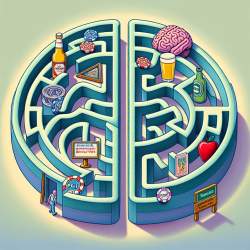Understanding Approach Bias: A Hidden Factor in Pornography Use
As a practitioner in the field of special education, understanding cognitive biases can enhance your ability to support students and their families. A recent study titled "Approach Bias for Erotic Stimuli in Heterosexual Male College Students Who Use Pornography" sheds light on the cognitive processes that may underlie problematic pornography use, offering insights that can be valuable for educators and therapists alike.
What is Approach Bias?
Approach bias refers to the automatic tendency to move towards certain stimuli rather than away from them. This bias is often seen in individuals with addictions, where the stimuli are related to their addiction. The study in question explored whether such a bias exists among heterosexual male college students who use pornography.
Key Findings of the Study
- The study found a significant approach bias for erotic stimuli compared to neutral stimuli among participants.
- Participants with problematic pornography use exhibited a stronger approach bias than those without such issues.
- The approach bias correlated with measures of pornography use, indicating a potential link between cognitive biases and the severity of use.
Implications for Practitioners
Understanding approach bias can help practitioners develop more effective interventions for students struggling with behavioral addictions. Here are some ways to apply these findings:
- Awareness and Education: Educate students and parents about cognitive biases and their potential impact on behavior. Awareness is the first step towards change.
- Behavioral Interventions: Consider incorporating cognitive retraining programs that focus on modifying approach biases. Such interventions have shown promise in substance addiction treatment and may be adapted for behavioral addictions.
- Further Research: Encourage further research into cognitive biases in different populations, including females and non-heterosexual individuals, to develop more inclusive interventions.
Encouraging Further Research
The study highlights the need for more research into cognitive biases and their role in behavioral addictions. By understanding these biases, practitioners can better support students and develop targeted interventions. For those interested in delving deeper into this topic, the original research paper offers a comprehensive analysis of the study's methodology and findings.
To read the original research paper, please follow this link: Approach bias for erotic stimuli in heterosexual male college students who use pornography.










